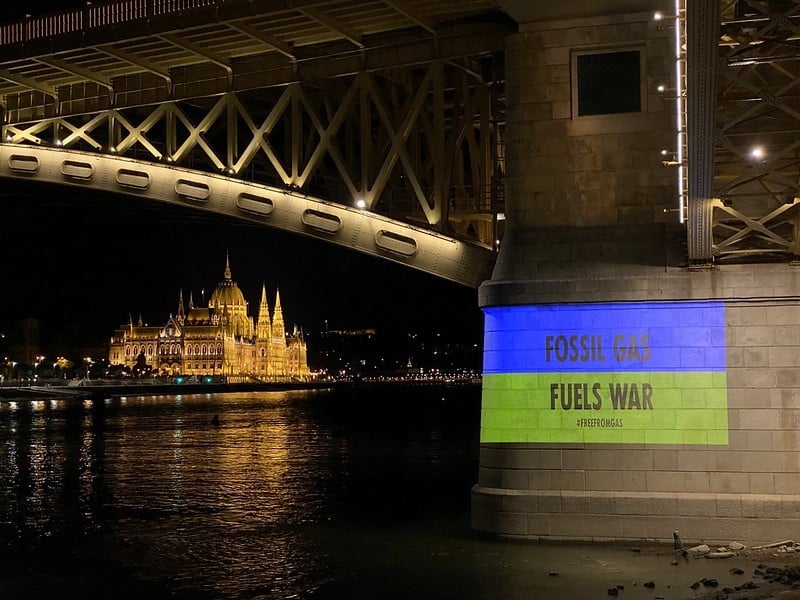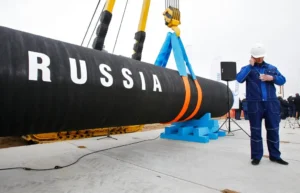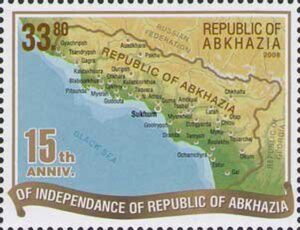A call to stop purchasing gas from Russia in Budapest, 2022 (Flickr)
Now that winter is approaching, European countries are increasingly concerned about where energy will be coming from. While Hungary, Serbia and Turkey are negotiating to open Russia’s gas tap, other countries are reliant instead on their neighbours’ reserves. Last week, Moldova saw its available reserves in Ukraine cut off by Russian missile strikes.
Russian-Turkish cooperation is old critique in a new guise
Due to the damage to the Nord Stream pipeline, Russia has turned its eye to Turkey as a new gas hub for supplies to the EU. At a summit in Kazakhstan, Putin and Erdogan had a meeting, with Putin proposing to supply gas for the EU via the TurkStream pipeline. It is a choice that could maintain Putin’s influence over Europe’s energy supply. Erdogan has instructed the Turkish government to start working on the Russian gas hub. Turkey acted as a mediator between Russia and Ukraine, of which the grain deal for Ukrainian exports is one of the results. However, energy cooperation between Russia and Turkey also seems to be a result of its attitude towards the war. Despite Turkey’s condemnation of the Russian invasion and political support for Ukraine, Erdogan continues to cultivate economic ties with Russia.
The Russian proposal is widely criticised by the EU as the sabotaged Nord Stream pipelines theoretically already provide an infrastructure for European gas supplies. In 2014, Putin gave in to opposition from Europe and the US to the long-planned South Stream pipeline, which would bring a large amount of gas to major customer Turkey. In its place was a smaller gas pipeline, supplying Hungary and other countries. Putin’s latest proposal appears to be a new variant of his earlier plan. After the annexation of Crimea and Russian interference in the Donbas, there were already plans to reduce European dependence on Russian gas. It was the underlying reason for Europe to vehemently protest against the South Stream line in the first place. The establishment of a Russian gas hub in Turkey effectively increases the gas infrastructure between Russia and Europe, and thus dependence on Russian gas.
EU and Russia bicker over gas supply
The Russian proposal did not come completely out of the blue. The European Union and Russia continue to quarrel over the sabotaged Nord Stream pipeline. The EU suspects Russia of the sabotage, an accusation that is firmly rejected by the Russian side. Following the announcement that the EU is working on a price cap for gas purchases, there was heavy criticism from the Kremlin.
The European ambition to reduce dependence on Russian gas after the annexation of Crimea seems to have borne little fruit. On the contrary, dependency has only increased in the last decade. In 2011, the Russian market share in natural gas imports into the European Union from non-EU countries was 30% according to Eurostat. In 2021, 39.2% came from Russia, which is about 2% more than in 2014 when Crimea was annexed. In 2019, well after the annexation of Crimea, it even peaked at 45.5%. In recent years, too little has actually been done to take action on gas diversification in Europe.
Regional dependence on Russian gas regarded as stumbling block
Some European countries in particular are heavily dependent on Russian gas. For instance, Serbia, still 89% dependent on Russian gas in 2019, recently struck a new deal with Gazprom. EU member state Hungary, still 61% dependent on Russian gas in 2021, also came to an agreement with the Russian state-owned company. Both countries can be supplied from Russia via the TurkStream gas pipeline. Hungary and Serbia’s recent deals with Russia are therefore explicable from an economic point of view, but politically polarising at a time when Europe needs to take a united stand against Russia precisely to put pressure on Putin and his war in Ukraine.
Meanwhile, other Balkan countries are diligently looking for alternatives to maintain gas supplies. Moldova, for example, recently struck a deal with both Ukraine and Romania to receive gas supplies after Gazprom had already partially shut off the gas tap in October. However, a new problem occurred following the large-scale Russian missile attacks on Ukraine on October 10, when the Moldovan government had to warn the population to limit gas use because of the damage to the energy network between Ukraine and Moldova.
Moldova, along with North Macedonia and Bosnia and Herzegovina, are among the countries completely dependent on Russian gas. Without European cooperation, alternatives for these countries are difficult to achieve in the short term. Northern Macedonia has recently entered into partnerships with Bulgaria and Greece to avoid another energy crisis and is looking at longer-term options to diversify gas supplies, for example with supply from Azerbaijan via Turkey.
What to expect?
Europe thus seems to be caught in a labyrinth of gas dependency in which the exit seems to be found only with continental cooperation. Given the current state of affairs, the chances of the EU using the Turkish gas hub seem unlikely, but the probability of countries in Southeast Europe using the hub seems inevitable without intensive European cooperation.
Author: Mathieu Neelen
Sources: AlJazeera1, AlJazeera2, BalkanInsight, BalkanGreenEnergyNews, Euractiv, NewYorkTimes1, NewYorkTimes2, Reuters1, Reuters2, Reuters3, Statista1, Statista2
Photo: Flickr



